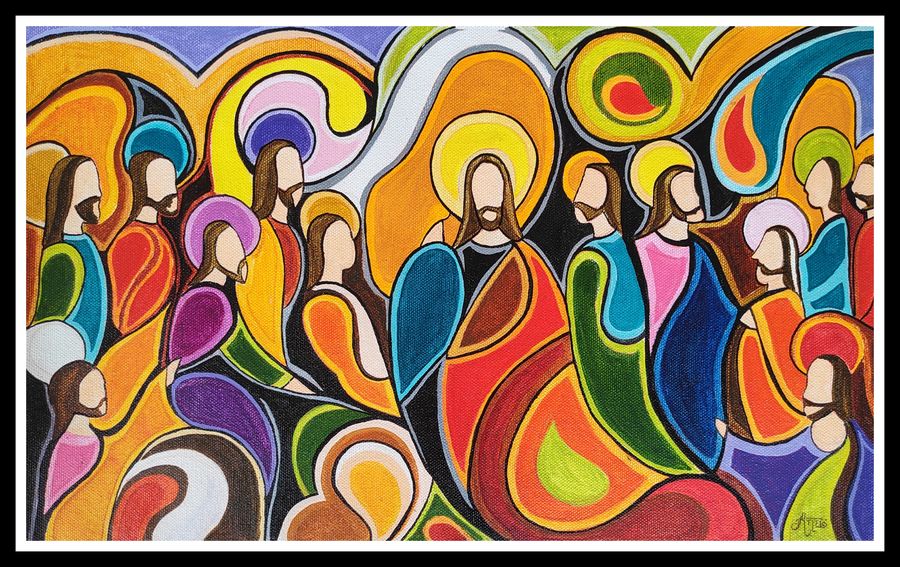|
Throughout the year, the Southern New England Conference of the United Church of Christ reproduces the Daily Lectionary for use by churches. These are the suggested readings for April 2nd: Exodus 12:21-27; Psalm 126; and John 11:45-57. I would encourage you to read these short selections as part of your Lenten practice.
The Exodus passage is the biblical background for the Jewish Feast of Passover. The Jews were enslaved in Egypt. Yahweh worked to set them free by convincing the Pharaoh that this would be the most prudent course of action. At first, Pharaoh dismissed the idea. This is where the familiar story of the ten plagues enters even into popular culture. Pharaoh vacillates in his decision making as the plagues add up. He promises to let the people go, and then he retracts the promise. The tenth and final plague is the death of every first born male in Egypt. The children of Israel are spared this mayhem by dabbing the blood of a Passover lamb on their doorposts. The way it is told in the Bible is that Yahweh prevents “the destroyer” from entering those homes. Instead, “the destroyer” will pass-over the homes of the Jewish families and wreak death on only the Egyptians. This theme of the Passover Lamb is embraced by John in his Gospel. From the very beginning of the Gospel, John depicts Jesus as identified by John the Baptist as “the Lamb of God.” (1:29) And you may notice that John the Baptist, only in the Gospel of John, never baptizes Jesus. When we turn to the end of the Gospel, we hear another anomaly. The Synoptics (Matthew, Mark and Luke) tell us that Jesus shared in the Passover meal with His disciples on the night before His crucifixion, which we call commonly the Last Supper. In John, however, Jesus is already in Pilate’s custody on “the day of Preparation for the Passover and it was about noon.” (19:14) Pilate hands Jesus over for crucifixion early in the afternoon of this same day. Thus, John intentionally has Jesus, the Lamb of God, sacrificed on the cross at the same time that the Passover lambs were being sacrificed in the Jerusalem Temple, seemingly a day prior to the account in the Synoptics. This idea of the Passover Lamb being sacrificed to avert “the destroyer,” and Jesus as the Lamb of God is reflected in today’s Gospel passage where it is written: “But one of them, Caiaphas, who was high priest that year, said to them, ‘You know nothing at all! You do not understand that it is better for you to have one man die for the people than to have the whole nation destroyed.’ He did not say this on his own, but being high priest that year he prophesied that Jesus was about to die for the nation, and not for the nation only, but to gather into one the dispersed children of God.” Jesus is the one who will be sacrificed so that all others may live. This is the mystery of Lent. Tomorrow is a Communion Sunday, a Sunday at which we are invited to join Jesus at table and to share in the sacred banquet. We enter into communion with Christ and with each other through this holy sacrament. We share in the Lamb of God. John emphasizes that Jesus does not die for “the nation only, but to gather into one the dispersed children of God.” Communion, likewise, is not limited to the ones who are judged worthy of belonging. It is shared as an invitation to bring others back to the table. In other words, all are welcome at our Communion Table just as Jesus, the Lamb of God, died for all people in order to bring all people together. Communion does not need to be protected any more than Jesus the Lamb of God needed to be protected. Jesus was strong enough to face down everything, including torture and death. We don’t need to protect Communion; we need to share it in the hopes of bringing the “dispersed children of God” back to the table to be in communion with Jesus. If you would like to join us at worship tomorrow, please know that you are more than welcome to come among us and share in our most precious gift. If you are unable, or would prefer, to join us online, please send an email to [email protected] for the login. If you’d like, here is the link to the Southern New England Conference’s daily reading schedule: www.sneucc.org/lectionary.
0 Comments
Leave a Reply. |
NewsFaith, love and chitchat. Categories
All
Archives
June 2024
Follow
|
|
SERVICE TIMES
Sunday 9:30-10:30am Children Sunday School 9:30-10:30am Nursery care available during worship DONATE Make a single or recurring contribution by clicking here |
FOLLOW
|

 RSS Feed
RSS Feed
